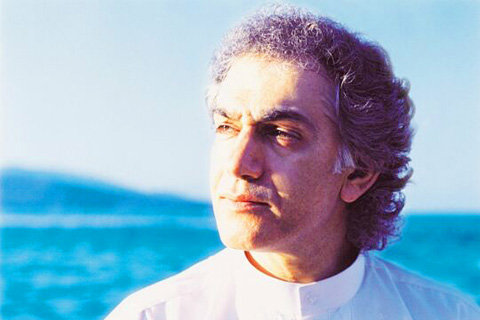Omar Faruk Tekbilek fits the romantic vision of a musician one might encounter on the Silk Road.
The Turkish-born multi-instrumentalist has performed on six continents, worked with many accomplished musicians, and seeks to promote peace through music. Then there is his spiritual journey: at a young age he studied to be an imam in a mosque, later immersed himself in Sufi mysticism, and now practices yoga, tai chi and qigong.
Tonight audiences in Taipei have the chance to imagine a musical encounter on the Silk Road — the theme of this year’s Taipei Traditional Arts Festival (2008台北市傳統藝術季), as Tekbilek appears with the Taipei Chinese Orchestra (台北市立國樂團).

PHOTO COURTESY OF TREE MUSIC
Tekbilek’s sound derives from a blend of classical Turkish, Arabic and Greek influences found in his hometown, Adana, a city on southern Turkey’s Mediterranean coast. He is considered a virtuoso on a number of instruments from the region: the zurna, a double reed instrument similar to the oboe; the oud, a Middle Eastern lute; the baglama, a long-necked lute; and the ney, a long bamboo flute.
For Tekbilek, “music is a prayer.” It is also joy. He beamed throughout a small press conference in Taipei on Wednesday, speaking enthusiastically about working with the orchestra, musical technique and Sufism.
Tekbilek was studying to become an imam at age 8 when he picked up his first instrument, the kaval, a wooden flute found in southeastern Europe and Turkey. This lured him away from the mosque, and he started playing music professionally at age 12. After moving to Istanbul to work as a session musician as an adult, Tekbilek became interested in Sufism, a set of mystical beliefs and practices in Islam.
The Sufi concept of unity of mind and body plays an important role in Tekbilek’s musical expression. “[A teacher taught me] when you play, you must have meaning, intention in your mind,” he said.
As a player of several wind instruments, Tekblilek focuses on breathing technique. He recalls another lesson from his Sufi teacher in playing the ney. The teacher told him to blow into the flute until the last of his breath was gone. “When there’s no breath left, you’re connected with God.” This concept led to Tekbilek’s interest in yoga, tai chi, and qigong, which he practices daily and considers a part of his music training.
Now based in the US, Tekbilek has enjoyed success on the world music scene. He won the Golden Belly musician of the year award in 1998 and 1999 and was nominated for a BBC Middle Eastern music award in 2003. He was also named a UNESCO Artist for Peace in 2005.
Past collaborators include legendary Pakistani singer Nusrat Fateh Ali Khan, jazz trumpeter Don Cherry, and drummer Ginger Baker, one of the founding members of Cream.
Tonight Tekbilek will play percussion, the baglama, and the ney with the orchestra, whose 50 members play traditional Chinese instruments. Also joining the orchestra is the Iranian percussion ensemble the Chemirani Trio, which will play a new composition written by conductor Yiu-Kwong Chung (鍾耀光). Chung says he looks forward to tonight’s concert, which will be in the “true spirit of Silk Road music.”

Behind a car repair business on a nondescript Thai street are the cherished pets of a rising TikTok animal influencer: two lions and a 200-kilogram lion-tiger hybrid called “Big George.” Lion ownership is legal in Thailand, and Tharnuwarht Plengkemratch is an enthusiastic advocate, posting updates on his feline companions to nearly three million followers. “They’re playful and affectionate, just like dogs or cats,” he said from inside their cage complex at his home in the northern city of Chiang Mai. Thailand’s captive lion population has exploded in recent years, with nearly 500 registered in zoos, breeding farms, petting cafes and homes. Experts warn the

The unexpected collapse of the recall campaigns is being viewed through many lenses, most of them skewed and self-absorbed. The international media unsurprisingly focuses on what they perceive as the message that Taiwanese voters were sending in the failure of the mass recall, especially to China, the US and to friendly Western nations. This made some sense prior to early last month. One of the main arguments used by recall campaigners for recalling Chinese Nationalist Party (KMT) lawmakers was that they were too pro-China, and by extension not to be trusted with defending the nation. Also by extension, that argument could be

Aug. 4 to Aug. 10 When Coca-Cola finally pushed its way into Taiwan’s market in 1968, it allegedly vowed to wipe out its major domestic rival Hey Song within five years. But Hey Song, which began as a manual operation in a family cow shed in 1925, had proven its resilience, surviving numerous setbacks — including the loss of autonomy and nearly all its assets due to the Japanese colonial government’s wartime economic policy. By the 1960s, Hey Song had risen to the top of Taiwan’s beverage industry. This success was driven not only by president Chang Wen-chi’s

The centuries-old fiery Chinese spirit baijiu (白酒), long associated with business dinners, is being reshaped to appeal to younger generations as its makers adapt to changing times. Mostly distilled from sorghum, the clear but pungent liquor contains as much as 60 percent alcohol. It’s the usual choice for toasts of gan bei (乾杯), the Chinese expression for bottoms up, and raucous drinking games. “If you like to drink spirits and you’ve never had baijiu, it’s kind of like eating noodles but you’ve never had spaghetti,” said Jim Boyce, a Canadian writer and wine expert who founded World Baijiu Day a decade